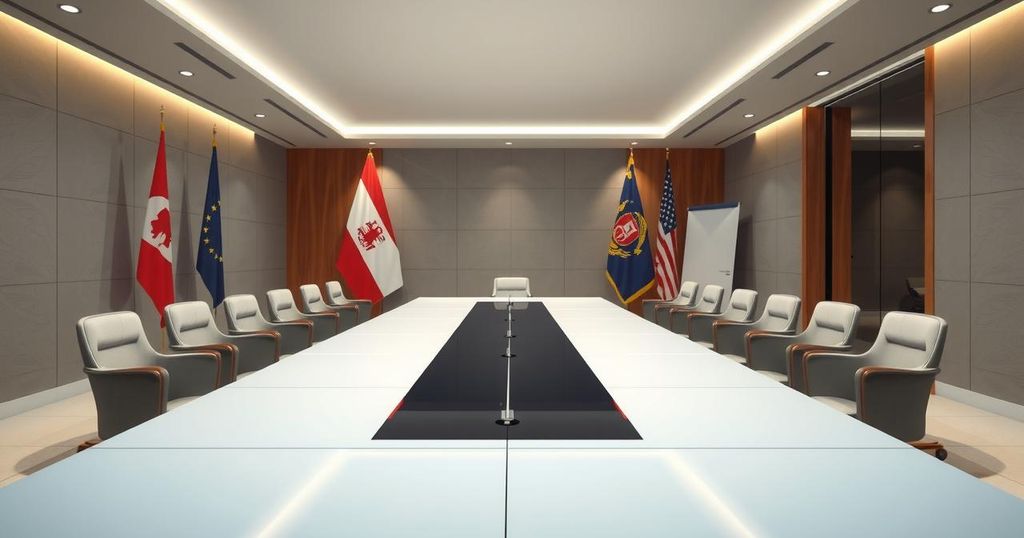Potential Trump-Putin Meeting in Saudi Arabia: A New Hope for Ukraine Ceasefire

A potential summit between Putin and Trump in Saudi Arabia could aim to establish a ceasefire in Ukraine, following positive discussions. Witkoff noted optimism about the truce, while caution persists from the Kremlin regarding Ukrainian commitments. A meeting is anticipated for March 23, 2025, amidst discussions of potential sanction relaxations if an agreement is reached.
A potential meeting between Russian President Vladimir Putin and former US President Donald Trump may occur in Saudi Arabia, according to US President’s Special Representative, Steve Witkoff. During an interview with Bloomberg, Witkoff expressed optimism, saying, “…my best bet on it is that it probably will happen,” while also suggesting that discussions on a ceasefire in Ukraine might reach conclusion within weeks.
The unfolding diplomatic efforts follow a meeting between US and Ukrainian delegations in Saudi Arabia, addressing military support and collaboration. A joint statement released by Ukraine’s President Volodymyr Zelenskyy’s office emphasized Ukraine’s readiness to consider a 30-day ceasefire proposed by the US, confirming the United States’ commitment to resume intelligence-sharing and military supplies.
Yuriy Ushakov, an aide to President Putin, indicated that any ceasefire proposal would need to consider Russian interests, suggesting the truce seemed merely a temporary solution for Ukrainian forces. With Witkoff involved in negotiations with both parties, he indicated that discussions regarding a full truce are expected to occur soon.
Recent communications between Trump and Putin involved exploring measures such as halting attacks on energy facilities for thirty days. Witkoff emphasized, “During our conversation, we talked about how to save lives, how to end this slaughter,” highlighting the urgent stakes of their discussions.
Despite Witkoff’s hopeful outlook on a ceasefire, the Kremlin expressed caution towards Ukrainian commitments. Dmitry Peskov, Press Secretary for President Putin, acknowledged a possible summit in Saudi Arabia while emphasizing that no concrete arrangements had been made yet. He noted a “general understanding” existed regarding this potential meeting.
Russian military leadership has indicated a willingness to reduce attacks on energy infrastructure. Reportedly, Putin stated, “Russia is going to adhere to its commitment to not hit energy infrastructure.” However, Ukrainian President Zelenskyy contended that Russia had breached prior commitments, citing recent attacks as evidence of this violation.
Looking forward, Witkoff mentioned that a US delegation would meet with Russian representatives in Saudi Arabia on March 23, though this date has not been publicly confirmed by Russian officials. Both parties are reportedly working to establish a timeline for these discussions, with Zelenskyy asserting that technical meetings would be facilitated to explore a potential cessation of hostilities.
Should a ceasefire be achieved, easing certain sanctions against Russia might be discussed, as indicated by Witkoff. However, this complex situation is marked by mutual distrust and urgent calls for resolution. Zelenskyy expressed concern that should Russia refuse the truce, pressure may increase on the Kremlin through enhanced economic sanctions, stating, “I hope if Russia does not agree to the truce, Trump will increase pressure on them through sanctions.”
As a potential Trump-Putin summit looms, the negotiations surrounding Ukraine reflect a precarious balance of power and the pressing humanitarian consequences of ongoing conflict. The veracity of proposed timelines remains uncertain, and it will be crucial to observe whether both nations will yield to necessary concessions for peace.
The prospective meeting between President Putin and former President Trump in Saudi Arabia marks an important development in ceasefire negotiations concerning Ukraine. With proactive communication efforts and the engagement of US representatives, there lies the potential for diplomatic resolutions amid ongoing conflict. However, the embedded mutual distrust necessitates cautious optimism, even as pressures mount for a substantial and lasting agreement. Further developments will undoubtedly shape the future of Ukraine and the broader geopolitical landscape.
Original Source: evrimagaci.org







